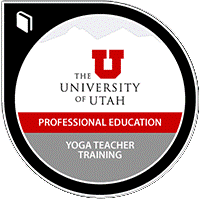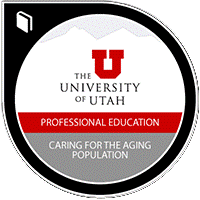Professional TESOL Certificate

- Prepares students from a variety of backgrounds to teach English to learners in the United States or abroad
- Provides a valuable credential backed by the reputation of the University of Utah that will increase success in a competitive job market
- Includes two practicum classes to gain real field and teaching experience
- Can be completed in as little as two semesters
- Can be completed 100% online, from anywhere in the world
Global and domestic demand has never been higher for qualified English language teachers and with demand comes competition for the best opportunities.
The Professional TESOL Certificate (Teaching English to Students of Other Languages) from the University of Utah provides the knowledge, practical experience and authoritative credential to help you successfully pursue a variety of rewarding teaching positions.
Whether you are seeking a long-term career or a life-changing cultural experience, we encourage you to consider the Professional TESOL Certificate as your gateway to a universe of teaching opportunities.
The Professional TESOL Certificate is offered in collaboration with the Department of Linguistics in the College of Humanities. These collaborative noncredit certificates utilize existing for-credit classes and as such, have unique application requirements which are described in the information below.
This noncredit Professional TESOL Certificate prepares students to teach English to learners in the United States or abroad. This is a basic level program.
Who Should Attend
The Professional TESOL Certificate is designed for individuals with a variety of professional and personal goals including:
- Those who are new to teaching English as well as experienced English language teaching professionals who want to strengthen their skills
- Native and non-native speaking teachers of English
- Those wanting to teach English as part of international cultural experiences
- Those with a desire to teach abroad in any context (K-12, college, private, tutoring)
- Those wanting to work with immigrant and refugee populations in the United States through nonprofit agencies and private language schools
Certificate Program Outcomes
- Keep up to date on the latest trends in language pedagogy.
- Practice teaching English to learners in the US or abroad.
- Ability to adapt instruction according to the learning needs and cultural backgrounds of students.
- Apply strategies and teaching techniques from methodology, along with other language principles, to teaching in a second language environment.
- Explore the rules of North American English grammar and some of the pitfalls students learning English might encounter.
- Examine the theory and methods that make up second-language teaching, considering past approaches.
- Reflect on peer teaching critiques and observations by experienced instructors.
What are career opportunities for TESOL professionals?
Learn more about opportunities available to those with a TESOL credential at TESOL International Association.
What are the differences between TESL, TEFL, and TESOL?
TESL refers to teaching English as a second language: programs in English-speaking countries for students whose first language is one other than English.
TEFL refers to teaching English as a foreign language: programs in countries where English is not the primary language and is not a lingua franca.
TESOL, which stands for teaching English to speakers of other languages, is a general name for the field of teaching that includes both TESL and TEFL.
Required Courses – There are 6 required courses. Courses meet with for-credit sections over a traditional 15 week format.
Format – Each course is offered in an online format every term, with select classes being offered in-person, varying by semester.
Program Start Options – This noncredit certificate program may be started at any time. All courses are available each semester, allowing students to plan their program of study in advance.
Course Sequencing – Below is the recommended guidelines for course sequencing:
It is recommended that LINGC 220 Intro to Study of Language be taken early in the program of study.
It is recommended that LINGC 581 L2 Methodology, be taken with or immediately following LINGC 220.
It is recommended that LINGC 583 Practicum, be taken as the final class in the certificate.
Students varying from the sequence should work with an academic advisor to determine the best options for taking courses.
Class Schedule – Online courses are conveniently available to students at any time.
Average Time to Complete – The certificate can be completed in as little as 2 semesters. Students must complete the program within five years. There is no minimum or maximum number of courses a student must or can take per semester.
Prerequisites – Students participating in this program must have a Bachelor’s degree. Non-native English speakers are welcome to participate in the program, but will need to have a minimum TOEFL score of 80 iBT, or minimum IELTS band score of 6.5.
Will this certificate meet the state licensing requirements?
This certificate will not help toward meeting licensure requirements for a Utah state teaching license.
Will taking the online certificate courses impact my Visa status?
Participants who are in the US studying on a Visa, are advised to check the requirement of their Visa to determine if these online courses will impact their Visa status.
The online Professional TESOL Certificate is a noncredit program with six required courses that are offered in a traditional semester schedule with fixed start and end dates. Courses meet with for-credit sections.
Notice: Beginning Summer 2024, the catalog number of three of our classes have changed to better align with the Department of Linguistics’ catalog numbers. Course content has NOT changed, only the numbers identifying the courses. Please reach out to certificates@utah.edu if you have questions or concerns.
Required Courses
LINGC 220 Introduction to the Study of Language
This course is an introduction to the nature of human language from the perspective of modern linguistics. The course focuses on sounds, words, and sentences through analysis of data from various languages. Additional topics may include: social and geographic variation, language change through time, first- and second-language acquisition, language and culture.
LINGC 260 Cross Cultural Communication
Brings together native and non-native speakers of English to explore the theory and practice of communication across languages and cultures.
LINGC 322 World Englishes
The purpose of this course is to investigate the spread of English as an international language: its historical development, socio-cultural diversity and linguistics variation. In addition to numerous readings on native and non-native varieties of English, which can be found throughout the world (e.g., Indian English, Singaporean English, Chicano English, etc.), topics related to educational linguistics within a World Englishes paradigm will also be addressed in order to better understand common pedagogical problems and concerns related to English language teaching in international contexts.
LINGC 350 Introduction to English Grammar
A descriptive overview of the forms and function of English grammar structures with guidance in standard usage.
LINGC 581 L2 Methodology (practical experience)
An examination of approaches and methods in second-language teaching, as well as the theories of language and language acquisition on which they are based. Discussion and practice of current assessment procedures. Also a focus on educators' implicit theories of L2 learning and teaching. Includes critiqued peer teaching.
LINGC 583 Practicum: Capstone
Observation and teaching of L2 classes.
Two of the classes require obtaining practical experience in an outside teaching environment. Is there assistance available to find qualifying opportunities?
Yes!
One of the biggest advantages of getting your TESOL certificate at the University of Utah is the one-on-one assistance available from our program staff. They have a strong local network with organizations that can provide meaningful practical experiences to match your goals.
NOTICE: Tuition for the program will increase roughly 3% beginning Fall 2026. Courses currently offered for $555 will increase to $575, and courses at $660 will increase to $680. The total for the certificate will be $3,660.
Noncredit tuition for the full certificate is $3,540. Textbooks are an additional cost (see below for more information). Tuition is due at the beginning of each course, offering a convenient pay-as-you-go option. Tuition listed above subject to change without advance notice.
Tuition for individual classes is as follows:
LINGC 220: Introduction to the Study of Language $555
LINGC 260: Cross Cultural Communication $555
LINGC 322: World Englishes $555
LINGC 350: Introduction to English Grammar $555
LINGC 581: L2 Methodology $660
LINGC 583 Practicum: Capstone $660
Textbooks are not included in the cost of enrollment and must be acquired by students individually. The Campus Bookstore has all required course materials, but you may find a better price shopping for used texts online (Amazon, Ebay, Abebooks, etc.). Be sure to search for what texts/materials are required for your courses. If no results show up for the class you search, this either means there are no required texts or the instructor has not indicated that there is required texts. Please make sure you register for your course(s) early so that you have time to get any required materials before classes start.
- Financial aid is not available for non-credit classes. Students are encouraged to inquire with their employers to determine if tuition assistance is available.
- Payment plans may be available through the University of Utah Financial Services.
- This course is eligible for faculty/staff tuition reduction or emeritus benefits.
- Students may drop and receive a refund for these classes up until the semester “Last Day to Drop”, which can be found on the Academic Calendar.
- GI Bill funds do not cover tuition for noncredit classes. Please contact the Veterans Support Center for questions about benefits advising.
Why choose the University of Utah?
We understand that you have a choice when it comes to taking professional development courses and we work hard to earn your trust with each and every class!
By selecting the University of Utah, you’ll enjoy the following benefits whether you’re coming to us as someone new to the job market, a career changer, a seasoned professional or a lifelong learner.
Resume Power - benefit from the University of Utah reputation for credibility and quality. Choosing the University of Utah for your certificate program makes a clear statement about your commitment to excellence.
Instructor Excellence - learn from the same high-quality faculty that teach in our degree programs.
The Power of the U Network – students have access to a valuable University of Utah peer and faculty network.
Programs that Fit Your Schedule – most of our certificates offer convenient online or evening classes that allow a schedule that works around you. Go to class whenever and wherever you want.
How to register for the Professional TESOL Certificate
- Register on this webpage, using the “Begin the Certificate Here” button above
- By registering, you are declaring: 1) your intention to complete the full certificate curriculum within the five (5) year limit requirement, and 2) that you have already earned a bachelor’s degree from an accredited university
- This certificate is not open to students admitted to the University of Utah as a matriculated (degree-seeking) or non-matriculated (non-degree seeking) student.
Deadlines and other important application information
- Registrations are accepted on an ongoing basis. For planning purposes, please register at least one month prior to the start of the semester. Registrations received within 5 working days of the start of the semester may not be able to start the program on time.
- All classes for this certificate start at the beginning of each semester and follow the academic calendar.
- Applicants can expect to receive information about their registration within 3 days of submission.
- Applicants are asked not to register for courses prior to being admitted into the certificate program. Details about how to register for classes will be included in all new student information.
- Students wishing to take courses individually and not as part of a certificate, do not need to submit a certificate registration and may register for classes through Academic Noncredit programs. Note that these classes cannot be applied towards a certificate at a later date. Some courses may not be offered for non-certificate seeking students.
Certificate Completion Requirements
- Students will be required to fulfill the same expectations and requirements as matriculated students including exams, projects and participation.
- Certificate students will receive an “S-Satisfactory” or “U-Unsatisfactory” assessment for each class. “S-Satisfactory” will indicate that the student has met the standards for at least a C-.
- Students must receive an “S-Satisfactory" grade in all classes for successful completion.
- Students must successfully complete all classes within 5 years of starting the certificate.
How is my accomplishment recognized?
For students earning an “S-Satisfactory" grade, the completed certificate will appear on University of Utah official transcripts.
Students will also be awarded a University of Utah digital credential (badge) that can be shared on social media sites and used with other professional resources. Digital badges are embedded with metadata that validate the skills demonstrated and other requirements for earning the badge.Digital Credentials / Badges

 Follow the link on the badge to the left to find out what metadata is behind the Yoga Teacher Training Certificate or Caring for the Aging Population Micro-certificate badge. This is an example of the type of information you’ll find behind all our academic noncredit certificates.
Follow the link on the badge to the left to find out what metadata is behind the Yoga Teacher Training Certificate or Caring for the Aging Population Micro-certificate badge. This is an example of the type of information you’ll find behind all our academic noncredit certificates.
Find out more about Digital Badges at the University of Utah »
Are there exams? Am I graded?
Certificate classes are graded with a "satisfactory" or "unsatisfactory" option. For successful certificate completion, students must achieve a "satisfactory" grade in all classes.
Can I apply these classes to a degree at the University of Utah?
This certificate is noncredit and cannot be applied to any for-credit degree.
Is there a minimum or maximum number of courses a student may take in a semester?
There is no minimum or maximum number of courses a student may take in a semester. The certificate must be completed within five (5) years. Students skipping one or more semesters are encouraged to communicate with their program advisor regarding completion plans.
Will I have flexibility in what classes I take and when?
Once admitted, students are responsible for enrolling in individual classes on their own through the Continuing Education website. Students may consult with the certificate program manager if they have questions about specific courses (See contact us section).
Are these classes eligible for federal financial aid?
Students pursuing a certificate are considered "non-degree seeking," a status that is not eligible for federal student aid loan programs.
What is the average weekly time commitment for each of the classes?
Students can expect to spend approximately 6 hours per week outside of the classroom, per class.
What are the online courses like?
The online courses in this certificate are flexible in that you don't have to attend online classes at a specific time. Our students use a combination of self-study and peer-to-peer interaction over an online learning network to facilitate instruction. You'll complete weekly assignments, readings, discussions, and occasional group work, as well as exams and other activities designed to enhance learning outcomes, all at times that are most convenient to you.
Using chat, video conferencing, phone calls, email, social media, bulletin boards, and more, you'll stay connected with fellow students and faculty, building personal networks along the way.
Your courses are developed by faculty and instructional designers who understand the specific needs of learners in an online environment. Special consideration is given to advance planning and setting expectations in the online classroom, so each curriculum is outlined in a syllabus distributed at the start of the course. This document provides an overview of the course assignments, grading strategy, student and faculty expectations, and course materials, as well as an understanding of the course goals and learning outcomes.
Does it matter which course I take first or in what order I take the classes?
Yes. Courses in this certificate program should be taken in sequential order. See the “Certificate Details” section above for more information.
Can I complete this program if I am not a resident in Utah? How do I get practicum hours if I don't live in Utah?
You can complete this certificate from anywhere! The practicum requires in-person hours wherever the student lives, and the instructor of the course can help with finding an option that would work for the student’s location and schedule.
Noncredit Certificates Program
Contact Noncredit Certificates Program for questions about certificate requirements, completion process, class registration or payment issues.
Taylor Bond
Certificates and Contracts Coordinator
certificates@utah.edu
(801) 581-7912
Department of Linguistics
Contact the Department Linguistics for questions about class experience and flow, pre-requisites, or any class-specific information.
Addison Eckhoff
Academic Advisor, Linguistics
University of Utah
(801) 581-8047
ling-advising@utah.edu
Upcoming Classes
| Class Title | Next Start Date |
|---|---|
| Cross-Cultural Communication | 05/11/2026 |

